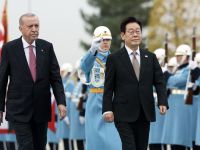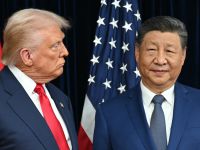A Taliban spokesman on Sunday denied a Northern Alliance claim that the opposition had captured the northeastern Afghan city of Taloqan, according to AFP.
The claim Taloqan had fallen to the opposition is "absolutely baseless," said Abdul Henan Hemat, head of the Taliban's Bakhter information agency.
The assertion that Taloqan had fallen was made on Sunday by Makhaiuddin Mekhdi, the deputy ambassador for the Afghan government-in-exile in the Tajik capital Dushanbe.
Taloqan, the capital of Takhar province, where fierce fighting was raging Sunday, was captured by the ruling Taliban in September last year.
Al Jazeera satllite channel reported that the rebel troops have moved 150 km towards Kabul after taking Toloqan.
The Alliance foreign minister Abdullah Abdullah was quoted by the station as saying that the coalition of opposition forces prefers to reach a political agreemnt before Kabul is conqured.
Securing Takhar would virtually complete the opposition sweep across much of northern Afghanistan. The alliance took the key city of Mazar-i-Sharif on Friday and has since captured five northern provinces.
The agency also reported that US Defense Secretary Donald Rumsfeld said Sunday there were "pockets of resistance" still fighting off the Northern Alliance in the pivotal city of Mazar-i-Sharif.
"The Northern Alliance has effective control of Mazar-i-Sharif at this moment, but there are pockets of resistance in the city that continue," Rumsfeld told Fox News Sunday.
"The airport has not been fully secured as of the last report I received, but it is close to being secured," he added.
Some 200 pro-Taliban Pakistani fighters were killed in Mazar-i-Sharif Friday and Saturday after the capture of that strategically important Afghan city by Northern Alliance forces.
Haji Mohammad Muhaqiq, who heads the faction representing the Shiite Hazara community, also told the Iranian Entekhab daily that the Northern Alliance had encircled some 1,200 Pakistanis, in the Maktab Soltan Raziyeh area, who were "not able to flee" with the Taliban.
"We gave them warnings to surrender," said Muhaqiq who also heads the political committee of the Hizb-i-Wahdat opposition movement.
"They asked us to send representatives over several times, but unfortunately they shot them. So far, six of our men (mujahedeen) have been killed," Muhaqiq said.
"Finally, we gave the order to attack them and the clashes are still continuing," Muhaqiq told the paper adding: "Some 200 of them (Pakistanis) have been killed."
Al Jazeera said that more than 200 civilians were killed when the skirts of Kandahar came under heavy attacks by the US warplanes.
And more than 35 Afghans were killed and 10 injured when the bus they were boarding was hit by a bomb, as the peasants were heading to harvest their crops near Kabul, said the station.
"Except for the Kunduz and Baqlan provinces, all the other areas of northern Afghanistan have been seized by the Northern Alliance," he said adding that the forces of Afghan warlord Abdul Rashid Dostam, as well as his own and those of Tajik commander Atta Mohammad were involved in capturing Mazar-i-Sharif.
"After the eradication of the Taliban from this city, the military forces will leave and the (responsibility) for the security of the town will be given to a group of 300 people from various mujahedeen groups," he said.
Muhaqiq also said that in case of any attempt at a new attack by the Taliban, which he claims is "no longer able to launch a counter attack ... we are completely ready."
Meanwhile, the press spokesman of the Pakistani embassy in Tehran, Mehtab Khan, told AFP that "no member of the Pakistani army is implicated in the combats in Afghanistan."
"The border between Pakistan and Afghanistan is long and porous and it is not possible to rule out the possibility that some Pakistanis enter Afghanistan in order to fight (alongside the Taliban) and in violation of the government's policies," he added.
Mazar-i-Sharif was captured Friday after a four-day push that saw the Northern Alliance secure control over five northern provinces.
The Taliban have confirmed the loss of four provinces, following what they described as a "strategic withdrawal" by militia troops.
The Northern Alliance has a core army of about 15,000 troops, which it claims has grown as the move toward Mazar-i-Sharif has gathered pace.
Its myriad factions, dominated by ethnic Tajiks, Uzbeks and Hazaras, have rival agendas, bitter rivalries and little influence in areas of southern Afghanistan dominated by the dominant ethnic Pashtun community.
Iran supports the Northern Alliance, and has never recognized Afghanistan's Taliban militia, but is nevertheless opposed to the US-led military attacks on its neighbor for sheltering Osama bin Laden, the alleged mastermind of the September 11 attacks on the United States.
Tehran has condemned the terror attacks on New York and Washington but has demanded that any international anti-terror campaign be led by the United Nations – Albawaba.com
© 2001 Al Bawaba (www.albawaba.com)







